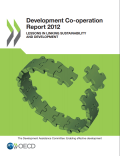The world faces old and new security challenges that are more complex than our multilateral and national institutions are currently capable of managing. Publics around the world remain focused on material standards of living; leaders are reluctant to expend political capital on long-term, global risk issues; multilateral ‘bandwidth’ remains low; in many cases it is unclear what solutions would look like. This paper argues for the need to place unsustainability squarely at the center of larger debates about globalisation and the global economy – in particular by focusing on three key areas:
1. Greening growth;
2. Equity in a world of limits; and
3. Building resilience to shocks and stresses.
This report reviews the economic and environmental consequences of resource inefficiency in Asia and the Pacific and some of its underlying causes. It examines a range of technical, policy, and institutional responses to encourage corporations and consumers alike to adopt more resource-efficient behaviors, with particular attention to the vital role governments must play in creating incentive structures, encouraging research and development for new technologies, improving institutions and information exchange, and other measures to move the region’s economies toward greater resource efficiency. This analysis is a contribution to the global G8 3R Initiative, which seeks to promote the “reduce, reuse, recycle” approach to waste management. While many of the specific strategies described are not new, the report should contribute to an understanding of the underlying reasons behind resource inefficiency, tools for its analysis, and specific interventions tailored to the Asia and Pacific context.
The report includes case studies from China, India, Japan, Lao, Nepal, Philippines and Thailand.

The Development Co-operation Report is the key annual reference document for statistics and analysis on trends in international aid. The Development Co-operation Report 2012 seeks to provide insights into how to address today’s sustainable development challenges, with a focus on inclusiveness and good governance to ensure that the world's finite resources are equitably distributed, now and in the future. Sharing finite resources among a growing number people – and consumers – is a critical challenge. It is in this spirit that J. Brian Atwood, Chair of the OECD Development Assistance Committee (DAC), invited several intellectual leaders on the challenges of inclusive, sustainable development to contribute to this year’s report.
Moving towards low-carbon, high-efficiency energy systems, mitigating climate change, securing energy supplies, and resolving the imbalance of payments caused by energy imports, are impending problems that nations worldwide are striving hard to resolve. This paper addresses three aspects of this problem:
- the role of markets, prices, and governments in this energy transformation
- identification of policy interventions that can become productive investments in the future
- the potential for low-carbon, high-efficiency energy to drive green growth
The paper notes that the policy choices for an energy system transformation largely relate to:
Mitigation and adaptation climate change policy cuts across all sectors of the economy and broader national priorities, such as poverty alleviation, sustainable development and economic growth. This paper outlines the evolution of the low-emission development strategies (LEDS) concept in the climate policy discourse and explores the existing strategies, action plans and documents. It defines LEDS as forward-looking national development strategies that encompass climate-resilient economic growth and looks at how they can ensure that they are effective and efficient in delivering intended goals. The aim of the paper is to:
